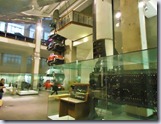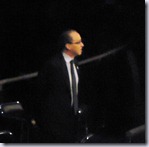 I have always lived in the future.
I have always lived in the future.
When I was young, I read Tom Swift books and imagined the things I could invent, the adventures I could have. I avidly followed ‘hard’ science fiction, especially Clarke and Wells. In elementary and high school, I took on a special science curriculum in fourth grade (Optimum conditions for growing brine shrimp as a prelude to establishing a salt water aquarium), assisted in the computer lab in high school (a PDP-8/S that I programmed in FOCAL), and hacked the school’s timeshare system in the Guidance office. I fell out of love with Physics and into affection with medical signals (and the campus radio station) in college, then on for advanced engineering and medical degrees. ‘never much good with hardware, I had a knack for programming signal interpretation, and that defined my passions and career path for decades to come.
 I visited the London Science Museum last Tuesday – it was coming home for me. Where I go through gardens, bird refuges, and natural history exhibits, I fall out of the ‘naming games’ that the British are so good at. But in halls of machines, I could name them all, knew their purpose, principles, and inventors. I was among familiar friends.
I visited the London Science Museum last Tuesday – it was coming home for me. Where I go through gardens, bird refuges, and natural history exhibits, I fall out of the ‘naming games’ that the British are so good at. But in halls of machines, I could name them all, knew their purpose, principles, and inventors. I was among familiar friends.
 The purpose of the visit was to hear Ray Kurzweil, an inventor and futurist who invented scanners, reading machines, music synthesizers. Lately, he’s been promoting the idea that all technologies grow exponentially, and that we would soon be facing a singular moment when machines become smarter than humans. At that point, they would become capable of advancing their own evolution, with uncertain consequences for humans left behind. Philosophers debate the consequences, engineers speculate how machines can be harnessed, but it seems clear to me that human dominance and self-determination would be at an end.
The purpose of the visit was to hear Ray Kurzweil, an inventor and futurist who invented scanners, reading machines, music synthesizers. Lately, he’s been promoting the idea that all technologies grow exponentially, and that we would soon be facing a singular moment when machines become smarter than humans. At that point, they would become capable of advancing their own evolution, with uncertain consequences for humans left behind. Philosophers debate the consequences, engineers speculate how machines can be harnessed, but it seems clear to me that human dominance and self-determination would be at an end.
The talk itself was a bit of a let-down: Prof Kurzweil has created a movie promoting his ideas and the MIT Forum meeting turned out to be a screening, preceded by some introductory remarks. I had to leave half-way through to catch the late train back to Cambridge, but absorbed the self-promotional thrust before leaving. I would have preferred to hear his ideas instead of his story, our future instead of his past.
 I hurried past the rows of silent machines: future vision can always be turned towards Cyberpunk-horror or Trek-utopianism. The debate has been going on for centuries, yet man always finds his way past the supposed end-times, yet never arriving at Ecotopia. I’m optimistic: machines ultimately serve human ends.
I hurried past the rows of silent machines: future vision can always be turned towards Cyberpunk-horror or Trek-utopianism. The debate has been going on for centuries, yet man always finds his way past the supposed end-times, yet never arriving at Ecotopia. I’m optimistic: machines ultimately serve human ends.
Yet, what if this time was different?
I’m reminded of another MIT scientist Edward Fredkin. I heard him speak in a radio interview, starting with a simple question. Throw a ball: imagine it stopped at an instant of time, mid—flight. Advance a moment, and the ball moves ahead in a straight line. Why does it do that?
To Friedkin, the ball must somehow remember where it has been to know where to go next. Or, perhaps, the space the ball is in remembers how it entered and has rules for where it should go next. Perhaps, then, the whole of space and time is made up of cells with programmed rules, much like John Conway’s Game of Life.
According to Friedkin, the universe is a computer, unwinding the future step by step according to local rules of “digital physics”. It’s a fascinating notion, yet one that comes up again and again. Thermodynamics, for example, has intimate links to information theory via entropy.
If space and time are quantized and the laws of physics reflect local rules coded into that cellular automata, then information is more fundamental than matter or energy. The physical universe and consciousness could simply be a solipsistic epiphenomena of this underling reality
So, Matrix-like, the Singularity could be the latest evolutionary refinement in how the Universe conceives Itself.
I smiled, headed toward the all-too-physical Tube with all-too-little Time. It would have made a better talk: be courageous with the idea that computing is fundamental and see where it takes you into the Future.
